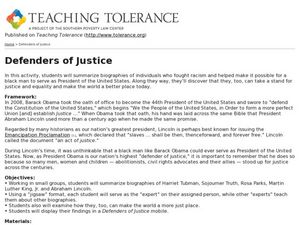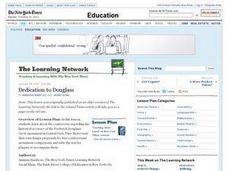National Endowment for the Humanities
A Debate Against Slavery
Slavery is a serious topic that can be challenging for middle schoolers to study. Young scholars can see firsthand through primary sources what occurred during that time period in the United States. The third of five lessons provides...
Center for History Education
Nineteenth Century Reform Movements: Women's Rights
It's hard to imagine a world where women were marginalized from the seats of power. Yet, there are women today who remember what it was like to not be allowed to vote. Using a DBQ of images and other primary sources, such as political...
PBS
The Meaning of the Fourteenth Amendment
The Fourteenth Amendment was extremely important to civil rights and is a crucial one to remember. The resource teaches about the Supreme Court decisions related to the amendment through writing exercises, reading, and working in small...
Curated OER
John and Mary Jones and the Importance of Oral History
Students examine the role of John and Mary Jones in the abolitionist movement. Using primary source documents, they discover the importance of an oral history and take notes on the Jones' role. They write a summary of the data to...
Curated OER
Louisa May Alcott: The Candle and the Mirror
High schoolers discuss the life of Louisa May Alcott and create an outline of a biography of her life and times. In this Louisa May Alcott lesson, students explore the Transcendentalist involvement in the abolitionist movement, relating...
Curated OER
Exploring the Life of a Slave
Eleventh graders explore importance of abolitionists who worked to advance freedoms of black Americans prior to/during Reconstruction era, read and identify key concepts in Frederick Douglass's narrative, recognize how Douglass's slave...
Curated OER
Trial of John Brown, 1857
Students examine how John Brown's 1857 trial related to conflicting viewpoints on slavery, view perspectives of radical abolitionists, moderate abolitionists, and slave owners, and form their own opinions on issue of slavery.
Curated OER
This Guilty Land
Students read and discuss several informational cards about John Brown, the historical context he lived in and his abolitionist cause. They complete a character chart and write an epitaph that conveys their opinion of his actions.
Curated OER
Only Passing Through: The Story of Sojourner Truth
Young scholars listen to Anne Rockwell's picture book biography of Sojourner Truth
to learn about this famous abolitionist/feminist as well as slave life in New York. Students make predictions about the book as it is read aloud. Young...
Curated OER
Defenders of Justice
Students research abolitionists, civil rights advocates, and their allies to learn about racism and justice. In this racism and justice lesson, students define justice and sing a song about activism. Students review the biographies...
Curated OER
The Age of Reform
High schoolers are introduced to a variety of reform movements within this lesson. They explore the beliefs and motivations of each group. Connections are made from these movements to present day situations and happenings.
Anti-Defamation League
Women's Suffrage, Racism, and Intersectionality
The Nineteenth Amendment granted women the right to vote—as long as they were white. High schoolers read articles and essays about racism in the suffrage movement and consider how intersectionality played a role in the movement. Scholars...
Polk County Public Schools
Suffragists
The Women's Rights movement is the focus of an engaging and collaborative exercise, in which young historians use information found in textbooks, class notes, and the provided documents to craft a DBQ essay.
Curated OER
Dedication to Douglass
Students study the controversy surrounding the proposed Frederick Douglass Circle monument in Central Park. They review the notion of historical inaccuracy by reading and discussing the article, "In Douglass Tribute, Slave Folklore and...
Curated OER
Reforms of the Mid-1800's
Seventh graders complete a unit of lessons on the reform movements of the mid-1800's in the U.S. They participate in an Internet scavenger hunt, analyze primary source documents, and develop and perform a simulation of a mid-19th century...
Curated OER
A Durable Memento: Portraits by Augustus Washington
Students read primary source newspaper articles from mid 19th century United States. The topics of the articles are slavery, abolitionism and colonization. Students are given several options for activities based on the readings.
Curated OER
Voyage to Freedom - What Does It Mean?
Fifth graders investigate the Underground Railroad by creating a quilt. In this U.S. History lesson, 5th graders discuss the history of slavery through a class "word splash" and by reading an Underground Railroad map online. Students...
Curated OER
John Brown's Raid on Harper's Ferry and John Brown's Body
Fourth graders discuss John's Brown's Raid on Harper's Ferry. In this John Brown instructional activity, 4th graders analyze a newspaper article about the raid, and write a descriptive obituary about John Brown. Students view pictures of...
Curated OER
Underground Railroad
Students explore the Underground Railroad. In this U.S. history and technology lesson, students research an assigned topic related to the Underground Railroad, such as "abolitionist," "conductor," or "station houses." Students design a...
Curated OER
Building a Memorial to the Underground Railroad
Students interpret historical evidence presented in primary and secondary resources. In this Underground Railroad lesson, students examine the attributes and function of the Underground Railroad in order to...
Curated OER
Examining Slave Auction Documents
Students compare the social and cultural characteristics of the North, the South, and the West during the antebellum period, including the lives of African Americans and social reform movements such as abolition and women’s rights.
PBS
African American History: Climbing the Wall
Imagine the challenge of trying to trace your family genealogy if no records were kept of births and deaths. Where would you look for information? What types of documents could provide you with the information you seek? History...
Core Knowledge Foundation
Early Presidents and Social Reformers
A unit by Core Knowledge begins with information about early United States presidents. Pupils then explore social reformers such as Sojourner Truth and Frederick Douglas, abolitionism, women's rights, and more. Participants listen and...
C3 Teachers
Uncle Tom’s Cabin: Can Words Lead to War?
"Words, words, words." Despite Hamlet's opinion, words can be significant. In this inquiry lesson, middle schoolers learn how the words in Harriet Beecher Stowe's Uncle Tom's Cabin, in the view of many, lead to the American Civil War. To...
Other popular searches
- Abolitionist Movement Goals
- Abolitionist Movement Kwl
- Abolitionist Movement Kl
- The Abolitionist Movement

























